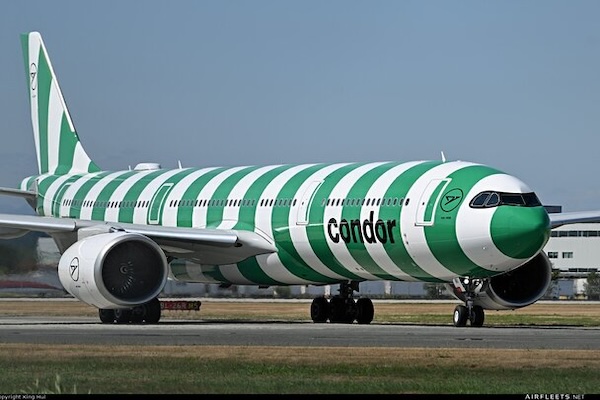The EU General Court’s annulment of the European Commission’s approval of state aid for Condor marks a victory for Ryanair and signals significant implications for the aviation sector.
This recent judicial ruling underscores the necessity for rigorous checks in the approval process of state aid, reaffirming the EU’s commitment to fair market competition.
Ryanair’s Challenge and EU’s Decision
In a significant development, the EU’s General Court has ruled against the European Commission’s approval of a €321 million state aid package intended for the restructuring of Condor, a German leisure airline. This decision marks a victory for Ryanair, which had contested the aid on grounds of unfair competition. The court highlighted that the Commission should have undergone a thorough investigation before granting the aid, suggesting negligence in following due procedure.
The ruling reiterated that the aid package should not have been approved without ensuring compliance with EU guidelines, such as proper burden-sharing and ensuring restructuring aid only if the state benefits from any future gains in the company’s value. Ryanair’s argument that the aid did not adversely impact its competitive position was acknowledged, yet the focus remained on procedural lapses by the Commission.
The Implications for Condor and Ryanair
For Condor, already beleaguered by the insolvency of its former owner Thomas Cook, the annulment of the aid leaves its future uncertain. Condor has a fleet of more than 50 aircraft spanning both short-haul and long-haul routes, and the loss of financial support might challenge its operational continuity.
Ryanair, on the other hand, perceives this ruling as aligning with the principles of fair competition. A spokesperson celebrated the verdict as a reinforcement of the EU’s commitment to a level playing field within the air transport market. Ryanair has consistently voiced concerns over state aid disrupting the competitive landscape, especially during the pandemic when numerous such packages were allocated.
Broader Impact on EU’s Aviation Market
This decision is poised to trigger wider ramifications across the EU aviation sector. It brings to light the scrutinised processes of granting state aid and the need for rigorous checks to avoid unfair advantage distribution.
More than €40 billion in state aid was allocated to various EU flag carriers during the pandemic, a point Ryanair emphasised as part of its critique. The court’s judgement may lead to reassessing similar aids approved during this period, potentially leading to a wave of legal contests and demands for aid recovery.
While Ryanair has not demonstrated that the Condor aid had a substantial adverse effect on its market position, the implications of this ruling could prompt further legal actions questioning other state aid approvals.
The Role of the European Commission and Future Insights
The European Commission is now faced with the task of revisiting its criteria and processes for state aid approvals, ensuring they align with EU’s competitive principles. The court’s decision acts as a reminder of the importance of transparency and adherence to formal inquiry processes before approving such substantial aid packages.
Future EU policies may be influenced by this case, guiding them towards more cautious and balanced state aid approvals. The overarching goal would be to prevent distortion in the market competition and uphold fair competitive practices.
This ruling underlines the necessity for immediate regulatory action to possibly recover unlawful state aid and mitigate any long-term impact on market dynamics. Such measures could lead to enhanced scrutiny on how state aid is distributed among EU-based airline operators.
Industry Reactions and Statements
Ryanair’s spokesperson hailed this judgment as a “triumph for fair competition and consumers,” reiterating the airline’s long-standing advocacy for competitive balance in the aviation market. The decision is seen as a validation of Ryanair’s persistent challenges to state aid decisions.
The industry at large may view this as a pivotal moment, reflecting on the need for equitable state intervention practices. Ryanair’s stance further resonates with airlines that did not receive similar aid during the pandemic, amplifying calls for a review of earlier decisions.
Condor’s position remains precarious, with the company having to reassess its options following the annulment. Strategic adjustments and potential new financial plans may be essential to navigate this setback effectively.
Legal Context and Historical Precedents
The judgment comes amid a history of legal challenges initiated by Ryanair against state aids perceived to violate competitive neutrality across Europe. The annulment of aid to Condor follows a similar decision involving state aid to SAS, Lufthansa, Air France-KLM, and certain Italian airlines.
These precedents highlight the judiciary’s critical role in arbitrating between competitive fairness and government intervention. They establish a clear legal framework that upholds the EU’s commitment to a single market with competitive parity.
The court’s intervention showcases its pivotal role in balancing national interests against cohesive EU market principles, setting a cautionary standard for future state interventions in private sectors.
Future Prospects for Condor
Condor’s path forward will likely require strategic restructuring and exploring alternative funding avenues. The absence of state aid necessitates innovative business strategies to remain competitive.
The airline’s commitment to serving diverse routes from short-haul to long-haul destinations will be tested, requiring robust financial health and operational efficiency. Condor’s management may need to engage in concerted efforts to stabilise its future operations.
As the industry watches, Condor’s response to this challenge may offer insights into how airlines can adapt to an increasingly scrutinised regulatory environment set by EU market rules.
The EU court’s decision against the state aid package for Condor reinforces the importance of competitive fairness in the aviation industry.
As Ryanair celebrates this outcome, the wider implications for EU’s aviation market policies and Condor’s future operations are yet to unfold.

